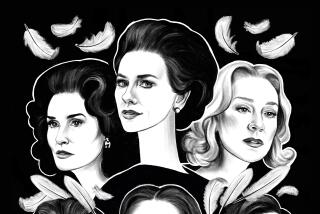Life After ‘Platoon’ : Year Since Big Oscar Win Has Brought Mixed Returns to Cast
NEW YORK — A year after “Platoon” swamped the Academy Awards, some of the lesser-known actors who sludged through that Oscar-laden war zone have prospered, while others are still scuffling.
Principal stars Charlie Sheen, Tom Berenger and Willem Dafoe all marched on to major projects: Sheen in “Wall Street,” Berenger in “Shoot to Kill” and Dafoe in the forthcoming “The Last Temptation of Christ.”
Among the grunts, most agree that appearing in the surprise hit Vietnam drama--which took Oscars for best picture, directing, sound and film editing--did help their careers in varying degrees.
John C. McGinley turned up as Sheen’s fast-talking, gum-chewing stockbroker buddy in “Wall Street.”
The young government guy in glasses who arrests Sheen in his Wall Street office? John Glover. He got killed by a booby trap early in “Platoon.”
Big Harold made it out OK, though. He was played by Forest Whitaker--who later was Robin Williams’ sidekick in “Good Morning, Vietnam.”
Johnny Depp, the young GI who spoke Vietnamese in “Platoon,” did OK, too. He co-stars in Fox Broadcasting’s “21 Jump Street.”
So goes life after “Platoon” for some of the less well-known actors who, with Sheen and Oscar nominees Dafoe and Berenger, shared two weeks of field training and two more months of filming in the Philippines in the late winter and spring of 1986.
Their ranks include Keith David, who played the tough, compassionate draftee from a ghetto who befriended Sheen in “Platoon.” He’s a three-tour Vietnam movie veteran: He also worked last year with “Platoon” colleague Dafoe in the upcoming “Saigon,” then, en route home from Bangkok, he stopped off in Manila to see some pals making a movie there and wound up as a Marine captain during the fall of Saigon in Chuck Norris’ third “Missing in Action.”
“We’re talking minuscule part,” David said, chuckling about that role, which was about as far as a Juilliard drama graduate can get from the New York and regional theaters in which he appeared before “Platoon.”
After “Platoon,” Ivan Kane moved with his wife, actress Suzy Sharp, from New York to Los Angeles. His background was the Off-Broadway stage. He quickly got a “Fame” episode.
But “basically, I had to start all over,” he said, “because any reputation I had in New York stayed in New York.”
Another stage-trained New York expatriate, Mark Moses, played the movie’s fumbling young lieutenant. He, too, landed TV work, starting with an “Ohara” episode on ABC, and a PBS drama, “The Silence at Bethany.”
“Platoon” helped him, “undoubtedly,” Moses said. “It helped everybody.” However, he recalled that before the film’s release he would face casting agents, talk about the movie and usually get this reply:
“Oh, you’re one of those crazy guys who went over to Manila.”
Crazy? Well, more than a few in the cast admitted to that description after their first week of rugged, full-pack bush training intended to give them the tired, haggard look of Vietnam grunts when filming began.
But in many cases, the friendships they began as members of a make-believe platoon have proved far more enduring than usually happens within other film or theatrical troupes.
“Not since Julliard have I formed such close friendships,” David said. “It was a unique experience with ‘Platoon’ . . . John McGinley is still a very good buddy. So is Tony Todd (another cast member).”
A number of them still hang out together, as well as keep in touch.
Depp’s Los Angeles apartment, for example, serves as a message center of sorts, and, on rare occasion, a place where some “Platoon” alumni are said to play poker and drink beer. Among the rare-occasion delegates: Dale Dye, a retired Marine captain. He trained the cast in combat matters and played an Army captain in the movie. He now plays a Navy skipper in ABC’s upcoming “Supercarrier” series.
They often tip each other about possible roles and sometimes recommend a “Platoon” pal for a part--as Berenger did on “Someone to Watch Over Me” for both Moses and Paul Sanchez, the film’s tall, quiet medic, the guy they called “Doc.”
In “Someone to Watch Over Me,” where Berenger starred as a detective, Moses played a nightclub owner, albeit one fatally stabbed early on. Alas, Sanchez, who last summer played a convict in a TV movie on NBC, “Six Against the Rock,” didn’t get the role for which Berenger had touted him.
“He felt real bad,” Sanchez said by phone from Los Angeles. “I said, ‘Look, you tried.’ But that’s what’s so good about this group of guys. It’s unlike any other film thing I’ve ever done. They’re so tight. And somebody in Tom’s position--he doesn’t have to do that.”
Whitaker, who also lives in Los Angeles, had a good film career going before and after “Platoon”--he was in “Fast Times at Ridgemont High,” “Vision Quest,” “Stakeout” and “The Color of Money.” And he recently finished filming the title role in “Bird,” a Clint Eastwood-directed film about the late jazz legend, Charlie Parker. (“Platoon” members David and Todd also are in it as jazz musicians.)
However, Whitaker also has stayed close to the guys from “Platoon” “more so than any film I’ve ever done.” The reason: “The camaraderie, the amount of hardships we went through together. . . . You don’t lose that bond.”
“I hate the word ‘bonding,’ ” said McGinley, a blunt, salty New Yorker. But during the training and the film, “everybody became tight, became friends. Everybody depended on everybody else, and for silly reasons.”
He cited one. Kevin Dillon, who played a vicious young killer named Bunny, “told me, ‘I don’t have enough water.’ He’s asking me because I played his sergeant. And I said, “I’m from New York City. What do you want me to do about your water?’ But he meant it.”
The training and filming gave the actors a small taste of what Vietnam must have been like--although for them it was a Vietnam of blanks, carefully controlled explosions and the ability to stop doom simply by shouting, “Cut!”
Still, in talking about returning to the States, several in the cast, fully aware that they had seen nothing compared to those who were in combat in Vietnam, expressed feelings of uneasiness or strangeness that in a way eerily echoed sentiments of those who had gone through the real thing years earlier.
Depp said he felt oddly depressed. He missed the guys, the closeness, and “it was almost the exact same thing that I’ve since talked to veterans about . . . that whole feeling, the camaraderie, the tightness.
“I missed that. That’s probably why we still hang out like fiends here.”
“I definitely experienced a strange culture shock,” Whitaker said. “I didn’t fit in for a moment there. . . . It was the weirdest thing. I took quite a while to accept being really back home.”
Why? “I guess because the project was so submerging. . . . It wasn’t that easy to just let it go. We were so far into the characters and what was going on. For me, it wasn’t that easy to drop it. I was surprised that happened.”
McGinley, not readily given to open introspection, also admitted that the experience and intensity of making “Platoon” had worked on his mind.
Unlike the usual film-making methods, most of the movie was shot in sequence. Near the end of filming, he said, “there were only about eight of us left. It was a mind-boggler”--he used a far stronger word--”the way Oliver did it. Because as guys ‘died,’ they left.”
When he first returned here, he said, he found himself restless, edgy. “So I just got on my motorbike and went out to Newark, to some batting cages. And I just hit balls until my hands were red.”
Things have long since returned to more-or-less normal for all concerned. But more-or-less normal can be weird too.
Last month, Depp was in Hawaii on a vacation from “21 Jump Street.” He went into a book store, he said, and there “I saw ‘Platoon: The Game.’ Cost $16.”
It blew his mind, he said. He laughed. “I bought it. It’s got all these little ambushes set up.”
More to Read
Only good movies
Get the Indie Focus newsletter, Mark Olsen's weekly guide to the world of cinema.
You may occasionally receive promotional content from the Los Angeles Times.










